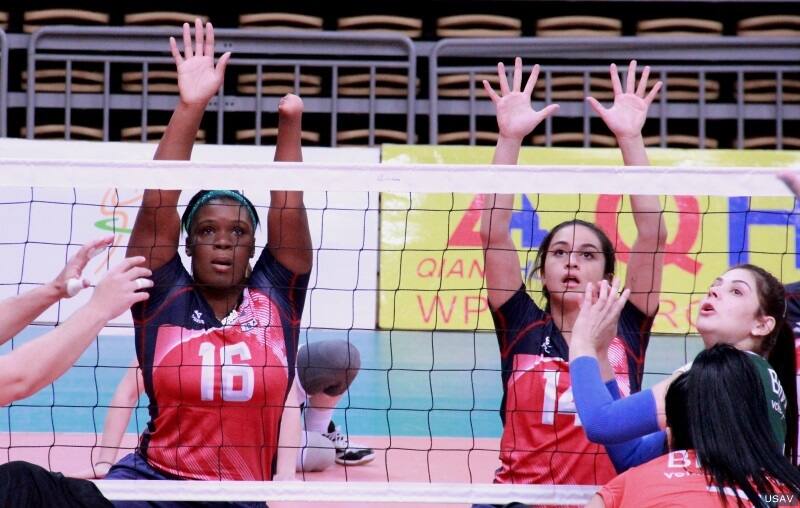
Colorado Springs, COLO. (April 28, 2016) – In sixth grade, Nicky Nieves (Kissimmee, Florida) began playing volleyball, quickly falling in love with the high-energy, fast-paced sport.
Now she uses her passion and experience as a member of the U.S. Women’s Sitting Team to teach kids with disabilities due to limb loss how to succeed in sports. Working with Nuability, a non-profit organization dedicated to getting kids, “off the bench and into the game of mainstreamed organized sports,” Nieves has added an educational component to her work and training as a professional athlete.
“Growing up I never had an avenue to ask someone how they got around (a limb loss disability),” Nieves said. “It’s cool to talk to these kids about their fears and goals and share with them because I was there.”
Born without her left hand, Nieves found high school success in volleyball – where she was named the Conference Player of the Year her senior year – as well as cheerleading and track and field. She also played one year of Division II college volleyball for Queen’s College in Queens, New York before joining the Women’s Sitting Team in 2011.
After being left off the roster for the 2012 London Paralympic Games, Nieves has spent four years improving her game; the hard work has paid off. The 5-10 middle blocker featured prominently at March’s Intercontinental Cup in China where she recorded 17 kills, 13 aces and nine blocks.
“Nicky is a pretty dynamic player who talks a lot and really pumps people up,” Women’s Sitting Team Head Coach Bill Hamiter said. “The energy she brings to the court has a real positive aspect and we try to use (her energy) as much as we can to encourage the rest of the team.”
Nieves’ energy also applies to her efforts to expand the game of sitting volleyball. The Kissimmee, Florida, resident has worked closely with Florida Region volunteer Linda Gomez to develop and expand the game.
“She has this God-given gift to promote her sport and motivate people around her,” Gomez said. “Whether it’s people from the Wounded Warriorsor children with disabilities, she’s an inspiration to so many people.”
Earlier in April, Nieves and Gomez traveled to a high school in Boca Raton, Florida, where they helped run a fundraiser for the Florida Region’s sitting volleyball program. Roughly $3,000 was raised during the event, which featured a demonstration by Nieves and a sitting match between the school’s boys’ and girls’ varsity squads.
“Nobody asked (the school). They just did it and it was pretty exciting,” Nieves said.
In 2015, Nieves coached at clinics for members of the Marines and Army ahead of the Warrior Games, also helping choose the respective rosters. Eventually she’d like to see open up her own club dedicated solely to sitting volleyball.
But first, she’s firmly focused on another goal: Winning a Paralympic gold medal.
After taking consecutive silver medals behind the Chinese women in 2008 and 2012, the U.S. Women’s Sitting Team has renewed fervor following March’s gold-medal performance.
While she normally fits training in around her busy volunteer, school and work schedules in Florida, Nieves is traveling to the University of Central Oklahoma in Edmond, Oklahoma to train with her teammates during June and July.
“I really want to work on being a better reader,” she said. “I feel my blocking has improved, but I could be so much better and I want to be a consistent player.”
And while nothing is guaranteed until Hamiter nominates the Paralympic roster some time before the July 26 deadline, Nieves has high hopes she can continue to influence and inspire people through volleyball.
“It’s really cool to see how people’s reactions have changed, even since (London),” she said. “We’ve come a long way from (the Paralympics) being seen as, ‘this cute little event for people with disabilities,’ to being a well-respected event.”

